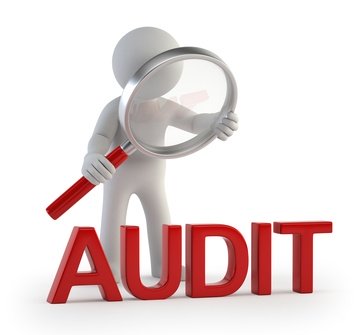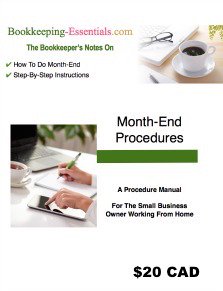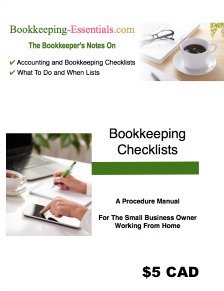
Common Audit Issues
Focus On Bookkeeping
by L. Kenway BComm (Retired CPB)
What You'll Find In This Chat

✔ Canadian sales tax audit issues
✔ Canadian payroll tax issues
✔ Taxes on insurance in Canada
✔ US audit techniques of cash businesses
✔ Traits of an underground worker
✔ US common payroll tax issues
I published a chat on common audit issues in Canada and the U.S. in the December 2011 issue of The Bookkeeper's Notes. I've updated the chat and present it here for your reference.
The self employed have a greater risk of being audited because of its cash components combined with fact that the tax system relies on self-assessment.
As you work through your month-end procedures, you may want to keep an eye out for CRA's and IRS's top audit issues. While this is definitely a Canadian topic, I did a little researching about IRS audit issues for my US readers as well. My Canadian readers may also like the IRS article I found on cash audit techniques.
Audit Issues in the United States
The IRS information on IRS Audit Techniques for Cash Intensive Businesses is excellent. If you decide to read the article, pay particular attention to the section on "Definition of a Cash Business" where the expected procedures are discussed. I also found the "Traits of an Underground Worker" interesting reading.
I came across an article titled "Solving twenty-nine of Americas most Common IRS problems" by taxhelponline.com. Some items that caught my eye for small business were missing receipts to prove deductions, under reporting income (known as skimming), and expense deductions disallowed as the business was classified as a hobby.
Nolo also has an excellent article titled "Preparing for a Business Audit" by Frederick W. Daily. A quick read through this article may highlight some inherent weaknesses in your current record keeping system. You can find the article at nolo.com> legal topics> taxes> business tax & deduction> Preparing for a Business Audit.
While researching this article for common payroll audit issues I came across an excellent article on the 5 Payroll Mistakes to Avoid. I also found mention that the IRS employment compliance audits (under the Employment Tax National Research Project) are focusing on worker classification, taxabililty of fringe benefits, reasonableness of executive compensation, backup withholding and Form 1099 reporting (source: www.uhyadvisors-us.com).
PMStax.com says that "fringe benefits include items such as transportation benefits, education assistance, and employee discounts. Fringe benefits that do not meet the applicable rules and documentation requirements can result in income to an employee as well as employment tax obligations on the employer". They also recommend reviewing your expense reimbursement procedures. So you may want to be proactive and get professional advice in these areas to audit proof yourself.
Download-construction-forms.com says "the IRS is looking for employee expense reimbursements that aren't paid through an "accountable" plan and, therefore, should be included in income and subject to employment taxes".
AIPB's recent free e-newsletter mentions that you can "include reimbursements in an employee’s paycheck provided that you separately identify the amount as reimbursed expenses".
Download-construction-forms.com also stated that two audit issues pertaining to executive compensation the IRS are focusing on are "C corporations that pay unreasonably high salaries disguised as dividends, and S corporation shareholders who receive unreasonably low compensation to reduce unemployment taxes".
If you think this topic affects you, you may want to read the nonprofitlaw.proskauer.com May 2011 article titled "IRS Warns that Fringe Benefits Trigger Intermediate Sanctions" by Kathleen E. Gerber where "excess benefit" is discussed.
Download-construction-forms.com source: December 2010 newsletter article - An employment tax audit by Leslie V. Guajardo, CPA, CCIFP
Audit Issues in Canada
When I researched this topic, I found two excellent articles about common sales tax audit issues CRA is auditing for.
In July 2011, E&Y released an article titled "Common GST/HST processing errors" by Alison Pavlin and Patricia Gurdyal of Toronto.
In November 2011, E&Y also released an article titled "GST/HST: hot audit topics" by Alicia Lennon of Toronto.
The most frequently identified sales tax issues were:
Bad Debts
- When writing off bad debt, you must also write-off the applicable portion of GST/HST. If you subsequently recover the bad debt, you must remit the applicable GST/HST component.
Imports
- Don't forget to claim the duty-paid value of any imported goods.
Intercompany charges
- Make sure any required elections are made and on file if you are not going to record the applicable GST/HST (i.e. you are treating the transaction as exempt supplies).
ITC Documentation
- The GST number must be valid and match the supplier.
- The ITC can only be claimed by the recipient of the supply; CRA checks to make sure the invoice or written agreement matches the party claiming the ITC. Apparently invoices with the short form of the company are even being challanged in some instances.
Rates of Tax
- The new place of supply rules for services that came into effect July 1, 2010 dictate that generally, the sales tax rate is based on the customer's business address. There are some exceptions. For goods delivered, it is generally based on where the goods were delivered to. Again there are some exceptions.
Reporting of GST/HST
- Often the wrong amounts are reported on the GST/HST return. Don't hesitate to track sales tax collection, input tax credits and recapture amounts in three separate accounts to reduce errors.
Restricted and Recaptured Input Tax Credits
- Neglecting to limit (restrict) meals and entertainment expenses to 50% because a company forgot to do their year-end adjustment. E&Y says to calculate your ITC BEFORE applying the provincial portion of 7/112th or 8/113th that is subject to recapture.
- There is no recapture of the provincial component of HST to consider in the harmonized Atlantic provinces. It applies only to Ontario (and BC when HST was in effect).
- In Ontario (and BC when HST was in effect), there is also recapture on telecommunication services, the purchase or lease of a licensed road vehicle weighing less than 3,000 kg, and energy not used in manufacturing or farming.
- ITCs are NOT allowed on dining or recreational facility membership fees or club dues.
Taxable Benefits
Researching payroll tax, I came across two excellent articles about common audit issues CRA is auditing for.
In November 2011, KPMG released an article titled "CRA Says Employers Cannot Pay Tax on Reassessed Taxable Benefits" by Andrea Shreeram of Toronto.
And as mentioned above in the sales tax section, in November 2011, E&Y released an article titled "GST/HST: hot audit topics" by Alicia Lennon of Toronto which touches on taxable benefits and the GST/HST component.
According to KPMG's article, they say that CRA is taking a results focused approach to auditing taxable benefits; they are not focusing on any one area of taxable benefits. This means if they "found that the construction industry has automobile benefits issues, then it will look for this item in all construction industry employer compliance audits".
E&Y's article points out that many small businesses don't realize that many "taxable benefits have a GST/HST component that must be remitted to the CRA each year".
Bookkeepers doing payroll may want to familiarize themselves with CRA's extremely useful taxable benefits chart which includes a column on the GST/HST components. An article on 5 Payroll Mistakes to Avoid is also a good read and a quick read.
You can find the full E&Y Canada articles on the their website under Services>TaxMatters. I recommend you read all three articles as I have just very briefly summarized the articles ... and likely done a very poor job of it.
An E&Y article by Alicia Lennon in the Financial Post in summer of 2012 touched on taxes on insurance. It pointed out:
- There are tax consequences from purchasing policies outside Canada or outside of the province where the risk is situated.
- There is an 18% federal excise tax levied on insurance premiums on unauthorized non-Canadian insurers or brokers. The tax does not apply to all types of insurance.
- Ontario, Quebec and Manitoba tax insurance premiums.
- BC, Alberta, Saskatchewan, Ontario and Quebec levy additional taxes on certain types of insurance.
The Financial Post article also discusses and explains the two different methods you can use to calculate ITCs on employee expense report reimbursements so as to reduce your audit issue exposure.
A more recent article I found was written by Collins Barrow. GST/HST Documentary Requirements and Common Audit Issues by Cathie Brogan discusses validity of your registration, adequate supporting documents and the recipient name.
As mentioned earlier, the name of the recipient MUST match the name of the business in order to claim an ITC. Purchases made by the owner on behalf of the corporation are noted as a common audit issue. ITCs are being denied if the receipt was made in the name of the owner as opposed to the corporation. The work around for this is to have the owner submit and be reimbursed by expense report.
Ms. Brogan's October 2014 article also references another article written in October 2011 by Chantal Guilmette discussing documentary information requirements for specific dollar thresholds. This article covers how to claim ITCs when one company pays the invoices for another and mentions that unvouchered cash payments made to coin and/or bill-operated machines are exempt and may be claimed.
You may also be interested in CRAs webcast titled "What to expect from an audit" located on their website under Learn more / Get help> Videos.

See you on the next page ...
Your tutor Lake
Enjoy A Tea Break With
Me Today. Let's Chat!
Use the search feature to quickly find the
information you're looking for.
Join Me On Facebook
Help support this site by "liking" me! Here's where I post current information.
Listed Under Websites NOT Local Business.
This website is NOT associated with the business operating in Bonnyville AB.



